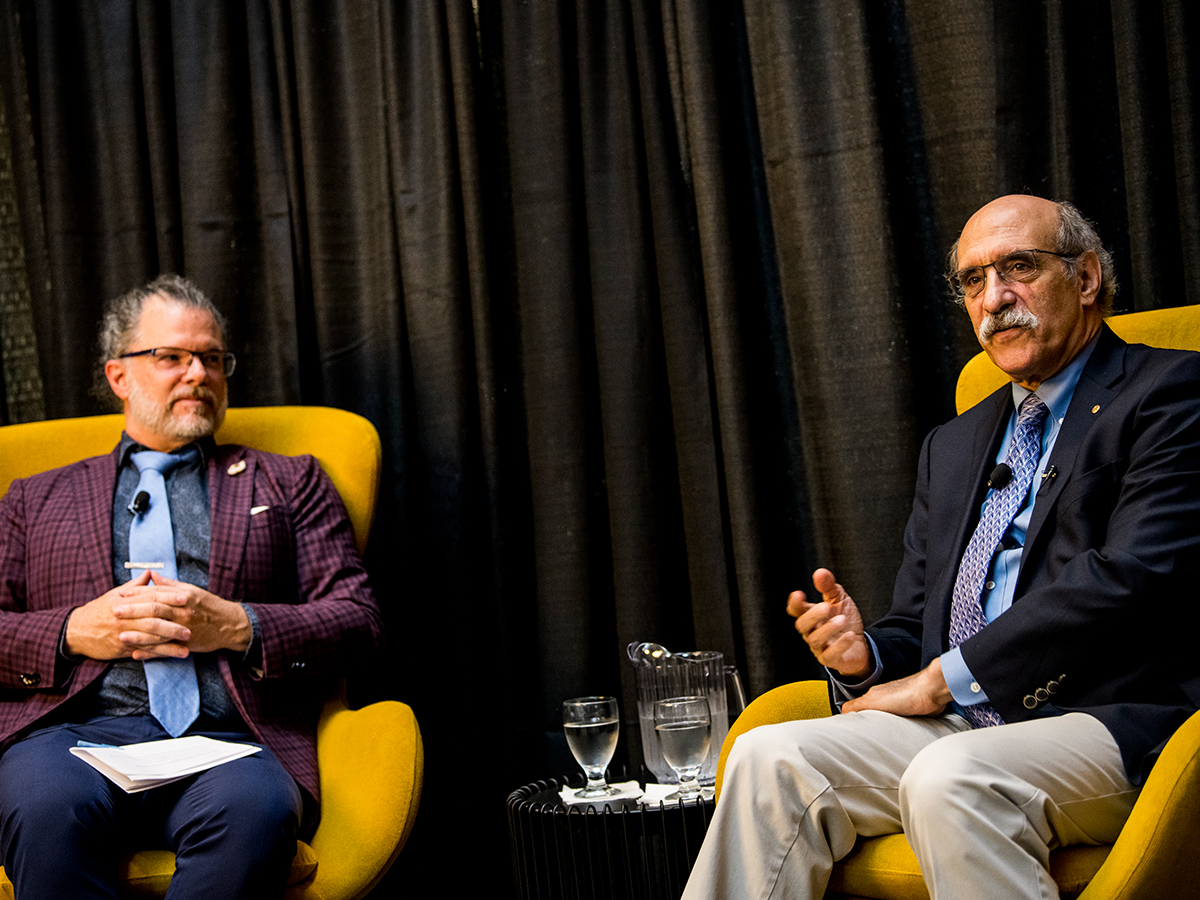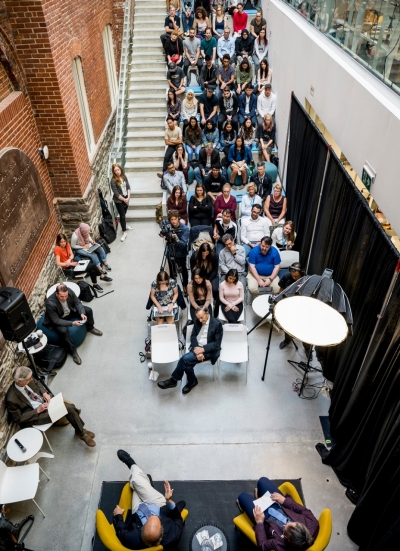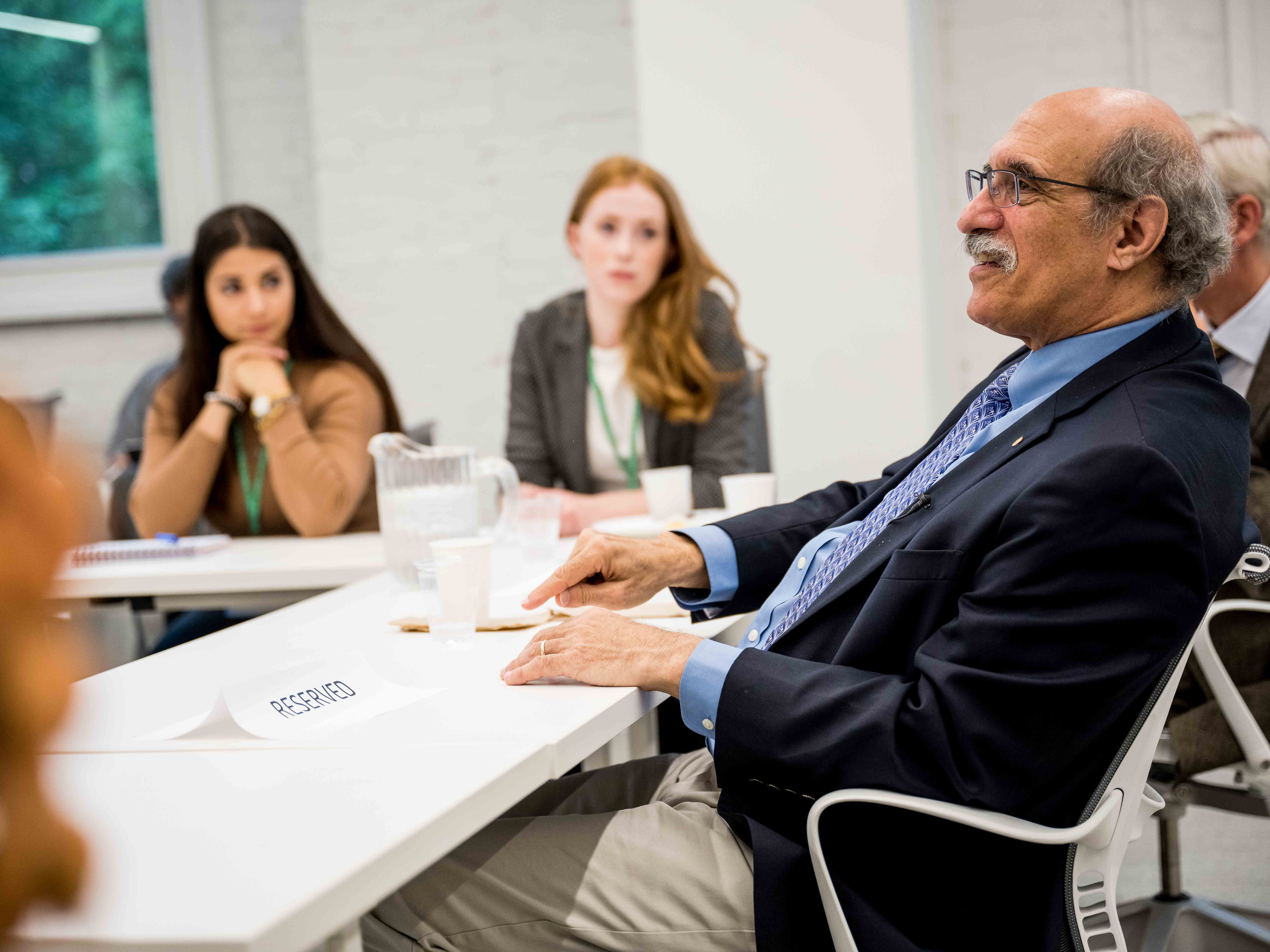Ryerson Hosts a First: Up Close and Personal with a Nobel Laureate

Meeting a Nobel Laureate isn’t your everyday occurrence. For a group of 70, September 24 was the day to interact with not one, but two, as Ryerson University’s Faculty of Science welcomed Martin Chalfie and VIP guest John Polanyi.
Events unfolded at the Centre for Urban Innovation as part of the Nobel Prize Inspiration Initiative (external link) (NPII) program – the first time the program has come to Canada. The initiative brings Nobel Laureates closer to scientific communities around the world – sharing their stories, perspectives and inspiration. Ryerson was Chalfie’s first stop in a three-day universities tour including University of Toronto, Queens and McGill.

Nobel Prize-Winning Research
Chalfie (external link) is a Harvard PhD and joint-recipient of the 2008 Nobel Prize (external link) in Chemistry. His work made possible the embedding of green fluorescent protein into organisms as biological markers. Use of the glowing tags lets researchers follow cellular activity that had previously remained invisible. The development has since become one of the most important tools in bioscience.
Getting Real with a Nobel Laureate
The event opened with an informal, on-stage chat between Chalfie and Dean of Science, David Cramb, and a live audience Q&A. A smaller group then gathered with Chalfie for a Graduate Students’ Round Table.
Together, Chalfie and the audience explored a mixed bag on the theme: What is an Authentic Science Experience? Early on, a strong message dominated: get students into the lab to see science as it’s really done – an experience that Chalfie says is “not really well described in a textbook,” with its twists, turns, unknowns…and failures.
Walking Students through the Valley of Shadow
Throughout, Chalfie spoke candidly – about the realities of contemporary science and his own ups and downs along the path. Chalfie recalled how, early on, he had “this incredibly stupid idea that real scientists don’t ask anyone for anything…and that you had to do it all on your own. So, no surprise that I was a complete and utter failure for the entire summer.”
Looking back, Chalfie offered words of wisdom: Failure is an obvious part of exploring problems yet to be solved. “You’re the first person in the world doing it,” he said. “We sort of stumble along. You’re two steps forward and one step back. Sometimes it feels like 20 steps back and no steps forward.”
John Polanyi (external link) , VIP guest and 1986 Chemistry Nobel Laureate, reflected further on the role of supervising professors. “It’s the job of Martin and me to hold people’s hand as they go through the valley of the shadow of death,” he said. “Just because there’s no answer at the moment doesn’t mean there will never be. As leaders, we know that.”

Redefining Student Success
Looking beyond challenging setbacks, Chalfie spoke of the potentially career-changing experience of working in a lab – many of his own students entering with different aspirations, but exiting with an ignited passion for research.
Chalfie also spoke of the need to relativize the overall importance of GPAs. Instead, he described his own gauge for student success using more telling factors: letters of recommendation, working style, initiative, enthusiasm, and more of what students want to do next over what they’d already done.
Food for Scientific Thought
Chalfie also entertained questions on contemporary issues in science. His perspectives left listeners with plentiful possibilities for further discussion on topics such as:
- Finding answers before – or even without – creating a hypothesis
- Encroaching subjectivity and dubious practices in “selling” science
- The future of machine learning in scientific research
- Using preprint archives for embargo-free access to new findings
Optimistic Outlook for Science
Many young scientists were eager for Chalfie’s success tips. Wary of slogans to ‘follow your passion’, Chalfie encouraged lifelong curiosity, continuous sampling of new ideas, and noticing the simplest, often overlooked possibilities around us for scientific exploration.
Asked if it’s harder to be a scientist in the 21st century, Chalfie returned with the question: “It’s more: If we had the choice, would we like to just keep going? … And the answer is: Absolutely.”
Toward closing, Chalfie encouraged students: “Enjoy what they’re doing… Are you excited about doing the science? If that’s what you get out of it, that’s perfect.”